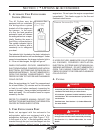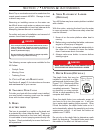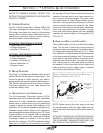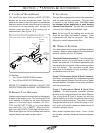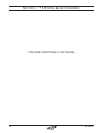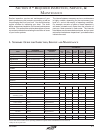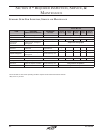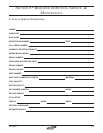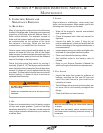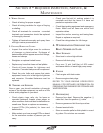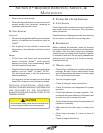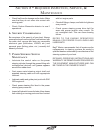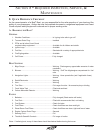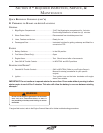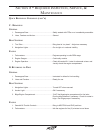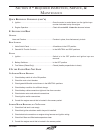
8.4 40 Outlaw
®
SeCtiOn 8 • required inSpeCtiOn, ServiCe, &
MaintenanCe
3. inspecTion, service anD
MainTenance proTocol
a. bilGe area
Many of your boat’s systems have critical features
located in the bilge area. A thorough and organized
inspection of the bilge area will address many of
these critical features. For example, engine oil
leaks and fuel system leaks will show themselves
as contamination on the surface of the liquid
that remains in the bilge. When you see such
contamination, you should look for its source.
Once or twice a year, pump the bilge areas dry and
remove all loose dirt. Be sure that all the limber
holes are open. Limber holes are the openings in the
stringers that allow water to ow from the outboard
areas of the bilge to the bilge sump.
Check the bilge pump oat switch by moving it
manually. (Figure 4.1.2) The bilge pump should start
when the oat switch is raised and should stop when
lowered. If it does not, have it replaced before using
your boat. The oat switch should also move freely
without sticking, if it does not, have it serviced or
replaced before boating.
1. oil
If there is oil contamination, look for leaks in engine
oil lines and engine gaskets. If parts of the bilge
have been stained by oil, the stain can be removed
using a bilge cleaner available from your dealer or
a marine store.
3. fuel sYsTeM
• Inspect the entire fuel system for evidence of
leakage, including the fuel tank ll lines and
vents. Any stain around a joint could be an
indication of a leak.
• Test all ttings with a wrench to be sure they are
not loose, but do not forcefully overtighten the
ttings.
• Clean fuel lters and vent screens.
2. enGine
Engine failure or malfunction, when away from
shore, can be dangerous. Make certain you do the
following each time you use the boat:
• Wipe off the engine to remove accumulated
dust, grease and oil.
• Check all exposed nuts, bolts and screws for
tightness.
• Inspect the belts for wear. If they do not
require replacement, check and adjust the belt
tension according to the engine manufacturer’s
recommendation.
• Inspect engine wiring, and clean and tighten the
terminals on the engine electrical system.
• Clean and lubricate the battery cables.
• Add distilled water to the battery cells as
needed.
• Refer to your Engine Operator’s Manual for
additional engine maintenance requirements.
DO NOT USE FLAMMABLE SOLVENTS to clean any
part of the bilge.
Fumes can accumulate and can be the source of an
explosion.
! WARNING
Work on electrical wiring can create shock hazards
or sparks.
Always shut off battery switch, breakers and/or
pull fuses before checking electrical wiring or
connectors.
! WARNING



